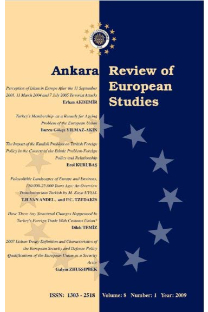NEOLIBERAL POLICY TOOL: ACTIVE LABOUR MARKET POLICIES IN TURKEY AND SPAIN
Neoliberal Politika Aracı: Türkiye’de ve İspanya’da Aktif İşgücü Piyasası Politikaları
___
- Althusser, Louis. Lenin and Philosophy and Other Essays. London: New Left Books, 1971.
- Bauman, Zygmunt. The Individualized Society. Cambridge: Polity Press, 2001.
- Beck, Ulrich. Risk Society. Towards a New Modernity. London: SAGE Publications Ltd, 1992.
- Blyth, Mark. Great Transformations: Economic Ideas and Institutional Change in the Twentieth Century. Cambridge: University Press, 2002.
- BOE. “Ley 32/1984, de 2 de agosto, Sobre Modificación de Determinados Artículos de la Ley 8/1980, de 10 de marzo, del Estatuto de los Trabajadores”, accessed August 22, 2018, https://www.boe.es/buscar/doc.php?id=BOE-A-1984-17436.
- BOE. “Ley 56/2003 de 16 de diciembre, de Empleo. Num.301”, accessed June 26, 2018, https://www.boe.es/buscar/act.php?id=BOE-A-2003-23102.
- Bourdieu, Pierre. Acts of Resistance. Against the New Myths of Our Time. Oxford: Blackwell Publishers Ltd, 1998.
- Ceylan-Ataman, Berrin. “Europeanization of Turkey Regarding the Employment and Social Policy” In The Europeanization of Turkish Public Policies: A Scorecard, edited by Tekin and Güney, 63-80. London: Routledge, 2016.
- Coutts, A et. al. The Health and Wellbeing Effects of Active Labor Market Programs. Interventions and Policies to Enhance Wellbeing: Wellbeing: A Complete Reference Guide, Volume VI, 2014.
- Crespo, Eduardo and Serrano, Amparo. “Political Production of Individualized Subjects in The Paradoxical Discourse of the EU Institutions” In Making it Personal: Individualizing Activation Services in the EU, edited by Van Rik B and Valkenburg B, 106-126. UK: University of Bristol, 2007.
- Crespo, Eduardo et al., “Del Gobierno del Trabajo al Gobierno de las Voluntades: El Caso de la Activación.” Psicoperspectivas. Cl. Individuo y Sociedad. Vol. VIII, N.2 (2009).
- Esping Andersen, G. The Three Worlds of Welfare Capitalism. Princeton University Press. ISBN 0691094578, 1990.
- European Commission. “Progress Report on Turkey, 1998”, accessed August 5, 2017, https://op.europa.eu/en/publication-detail/-/publication/38c51f03-fc60-450a9fbf-8516459c865f.
- European Commission. “Towards Common Principles of Flexicurity: More and better jobs through flexibility and security.”, accessed September 20, 2018, https://eurlex.europa.eu/LexUriServ/LexUriServ.do?uri=COM:2007:0359:FIN:EN:PDF.
- European Council. “1990/70/EC of 28 June 1990 concerning the framework agreement on fixed-term work concluded by ETUC, UNICE and CEEP”, accessed June 23, 2018, https://eur-lex.europa.eu/legalcontent/EN/TXT/?uri=CELEX:31999L0070.
- Ferrera, M. The Southern Model of Welfare in Social Europe. Journal of European Social Policy. Volume 6. Issue.1. February, 1996.
- Foucault, Michel. The Birth of Biopolitics. Lectures at the Collége de France, 1978- 1979. UK: PalgraveMacmillan, [1977-1978] 2008.
- García, Gustavo et al., “Índice DEC 2018. Índice de Desarrollo de los Servicios Sociales. Asociación Estatal de Directores y Gerentes en Servicios Sociales”, accessed December, 23, 2018, https://www.directoressociales.com/images/INDICEDEC/DEC2018real/REVI STA%20web.pdf.
- Harvey, David. A Brief History of Neoliberalism. UK:Oxford University Press., 2005.
- ILO. “World of Work Report 2008: Income Inequalities in the Age of Financial Globalisation”. International Labour Office, International Institute for Labour Studies. Geneva: ILO, 2008.
- ILO. “World Social Protection Report 2020–22: Social protection at the crossroads – in pursuit of a better future”. International Labour Office. Geneva: ILO, 2021.
- İŞKUR. Yıllık Bülten Tabloları 2017. X. Bölüm. Tablo 46: 2017 yılında İl Düzeyinde Yaş Gruplarına Göre Kursiyerler. Tablo 47: 2017 yılında İl Düzeyinde Öğrenim Durumlarına Göre Kursiyerler. 2018.
- Koistinen P et al., ed. Emerging Systems of Work and Welfare. Conclusions. P.I.E. Peter Lang S.A, 2009.
- Ministerio de Empleo y Seguridad Social. Estadísticas. Políticas del Mercado de Trabajo. Formación Profesional y Medidas de Apoyo al Empleo. Formación Profesional para el Empleo. Gobierno de España. Madrid. 2018.
- Moreno, Luis and Serrano, Amparo. “The Europeanization and Spanish Welfare: The Case of Employment Policy” In The Spanish Welfare State in European Context, edited by Guillén, and León. London: Routledge, 2011.
- Official Gazette of the Republic of Turkey. İş Kanunu. 10 Haziran 2003. Kanun no:4857 Sayı: 25134.
- Puig- Barrachina, V. et. al. “The Impact of Active Labour Market Policies on Health Outcomes: A Scoping Review”. European Journal of Public Health, Vol:30, Issue 1, 2020.
- Puig-Barrachina and Malmusi et al., “How does a targeted active labour market program impact on the well-being of the unemployed? A concept mapping study on Barcelona Employment in the Neighbourhoods”. BMC Public Health 20, 345, 2020.
- Revilla and Serrano. “Normative Foundations of Activation Regimes”. Paper Prepared for the ESPANET Conference, Vienna University of Economic and Business Administration, Austria. (20-22 September 2007).
- Schmidt and Hersh. “Neoliberal Globalization: Workfare without Welfare”. Globalizations, 3(1), 2006: pp.69–89.
- Serrano, Amparo. “Are European Activation Policies Converging?” In Labour and Employment Regulation in Europe, Lind, Knudsen, and Jorgensen. Peter Lang S.A., 2004.
- Standing, Guy. The Precariat under Rentier Capitalism. Institute for New Economic Thinking. Institute for New Economic Thinking. October, 2017
- Van Berkel and Hornemann Moller, ed. “Active Social Policies in the EU. Inclusion through Participation?”, UK: Policy Press, 2002.
- Wang S et al., “Can Active Labour Market Programmes Emulate the Mental Health Benefits of Regular Paid Employment? Longitudinal Evidence from the United Kingdom”, Work, Employment and Society, 2020: pp. 1-21.
- ISSN: 1303-2518
- Yayın Aralığı: 2
- Başlangıç: 2001
- Yayıncı: Ankara Üniversitesi Avrupa Toplulukları Araştırma ve Uygulama Merkezi
NEOLIBERAL POLICY TOOL: ACTIVE LABOUR MARKET POLICIES IN TURKEY AND SPAIN
Mustafa T. KARAYİĞİT, Julija ILHAN
2021 AB Ticaret Politikası İncelemesi: Ticaret Stratejisinde Değişim ve Yeni Girişimler
Avrupa Siber Güvenlik Politikasının Gelişimi: Eşgüdümcü Rol’den Siber Güce?
AB DENİZ GÜVENLİĞİ STRATEJİSİ: TEORİK BİR İNCELEME
Neoliberal Politika Aracı: Türkiye’de ve İspanya’da Aktif İşgücü Piyasası Politikaları
